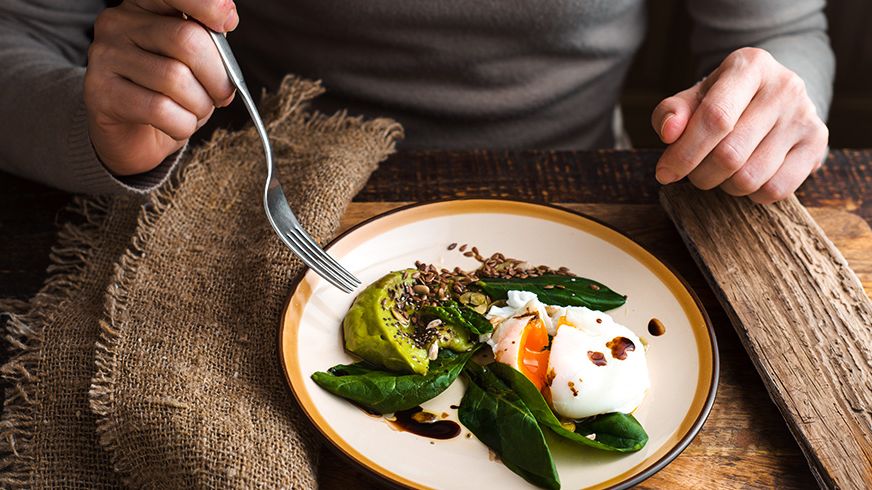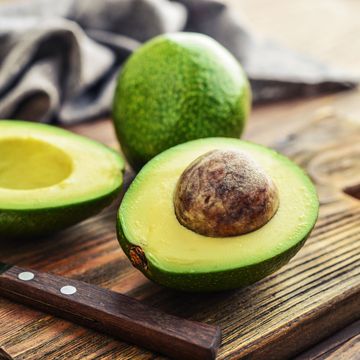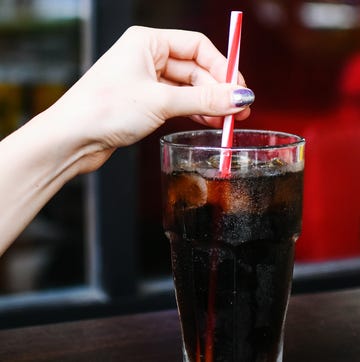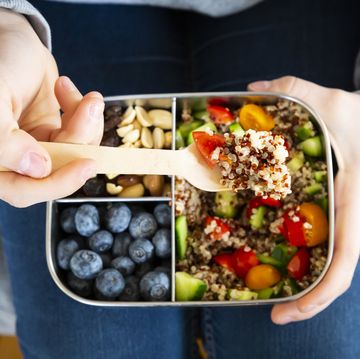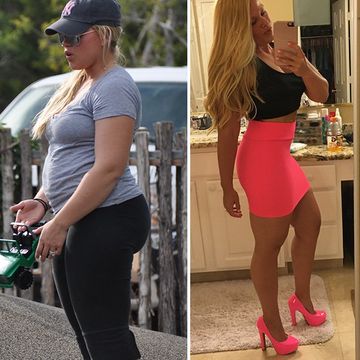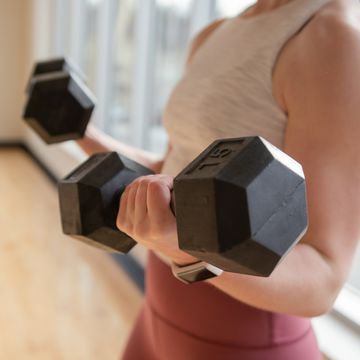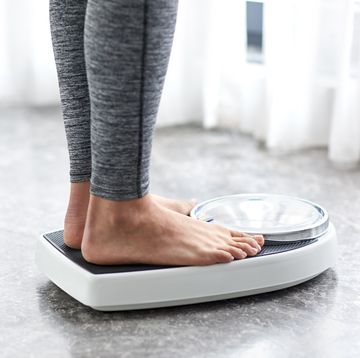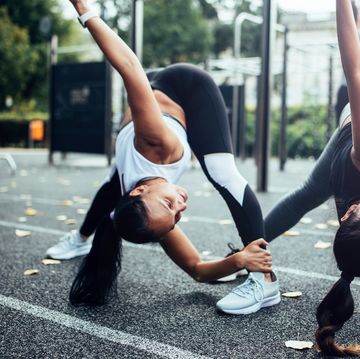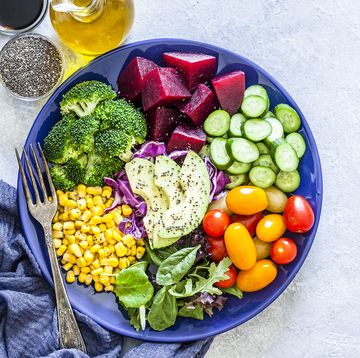The keto diet is easily one of the most popular weight-loss eating plans out there to date, and celebs have been raving about it for years. ICYMI, the keto diet is very high in fat and low in carbs. The goal is to get yourself into a state called ketosis, where you start burning fat instead of carbs for energy.
That requires eating less than 30 to 40 grams of carbs a day, explains Alissa Rumsey, RD, the owner of the Rumsey Education and Training Collective. “When you only eat a very limited amount of carbs, your body breaks down fatty acids from your fat stores and forms ketones, which are released into the bloodstream by the liver,” she explains. Technically speaking, ketosis occurs when your blood ketone levels are higher than normal.
But is it safe for your body to be in ketosis? Well, it's complicated. Your body can use fat for fuel instead of glucose from carbs, but as the saying goes: Just because you can doesn't mean you should. And in this case, the body can be in ketosis, but that doesn't necessarily mean it's what's superior, says Carrie Dennett, RD, the owner of Nutrition by Carrie.
If you're going into ketosis, you want to stay there. Going back and forth can prolong side effects, negate any benefits, and could be harmful for some people, Dennett notes. It takes the body about three to four days to start burning fat for fuel, but the full transition takes roughly a week. So try not to get tempted by the idea of taking the occasional keto break.
Besides getting a blood test, there are ways to find out if you've reached your goal. To know if you're in ketosis, look for these symptoms you besides weight loss.
Meet the experts: Carrie Dennett, RDN, is a registered dietitian nutritionist and journalist who has been reporting on ketogenic diets for five years.
Alissa Rumsey, RD, is a certified strength and conditioning specialist. She is also the author of Unapologetic Eating: Make Peace With Food and Transform Your Life.
1. You have bad breath.
It's unfortunate but true: One of the major signs of ketosis is stinky breath. When you’re in this state, your body breaks down fat and proteins for energy, creating byproducts that have to be eliminated, says Scott Keatley, RD, of Keatley Medical Nutrition Therapy. There are a few ways it does this, he says: through your poop, pee, sweat...and breath.
A byproduct of this breakdown of fat and protein into energy is a ketone body called acetone (yep, the same stuff that’s in nail polish remover). “A little bit of acetone on the breath has a fruity smell, but a lot has a very distinct astringent smell that is quite unpleasant,” Keatley says. “This is a general sign that you're in ketosis and you're burning protein or fat as a source of energy.”
Still, no one wants to walk around with stinky breath all day. The smell may improve over time, but there are also a few ways to help. "Some people brush their teeth several times a day to try to mask the smell, but this may be rough on your gums," Dennett says. "Chewing sugar-free gum is also a way to try to mask, but some people experience digestive distress from the sugar alcohols [such as] sorbitol, mannitol, xylitol and other -ols—commonly used in place of sugar." So go easy on the brushing and gums.
2. You feel totally wiped out.
When you first go into ketosis, your body gets confused by the fact that it doesn’t have the normal amount of carbs to burn for energy, says Peter LePort, MD, a bariatric surgeon and medical director of MemorialCare Surgical Weight Loss Center at Orange Coast Medical Center in Fountain Valley, California. As a result, you feel completely exhausted.
This first week on keto means you'll most likely have to deal with low energy levels among other symptoms like headache, brain fog, digestive distress, sleep disturbances, and cravings. This is all part of keto flu, and unfortunately, you'll simply have to ride these times out. However, Dennett recommends drinking a lot fluids and eating more electrolyte-rich foods.
3. …But then you're super-energized.
Eventually, your body figures out that you can get by just fine by burning fat and protein for energy, so you start to feel a little more energetic, Dr. LePort says. But that's likely a placebo effect more than anything, given that it's basically just an improvement from feeling super tired all the time.
Depending on your prior eating habits, it's possible that using fat as fuel may be supplying you with steady energy, says Dennett.
4. Your appetite decreases.
This is a legit phenomenon that happens, but it's not totally clear why. There are some theories, though, Keatley says. It could be that the bacteria in your gut changes due to your new diet, he says. It could also be that the ketones affect the hypothalamus in your brain and cause a different release of hormones, making you less hungry in the process, Dr. LePort says. "It may be because people are eating more protein—within the restrictions imposed by a true ketogenic diet—and are finding that satiating," Dennett says.
Whatever it is, it’s not uncommon to feel less hungry when you enter ketosis.
5. You spend tons of time in the restroom.
When you go on keto, your start eating some serious fat, and your body just isn’t ready for it, Keatley says. “Your body doesn't digest it properly and the bacteria in your gut is not ready to break it down,” he explains. This can lead to diarrhea or a temporary disorder called steatorrhea, which causes really smelly poop. “This should subside after a little bit, but you can always ease into a keto diet rather than jump all in to avoid these issues,” Keatley says.
To help alleviate constipation or abdominal pain, Dennett suggests drinking plenty of fluids and eat low-carb sources of fiber.
6. You feel thirsty more often.
When you switch over to a keto diet, your body loses a lot of water as it uses up the glucose that is stored in the muscles before it begins to burn fat, says Dennett. "Your body stores water along with glucose—it’s the “hydrate” in carbohydrate.This accounts for most of the initial weight loss, and it may also make you thirstier than usual," she explains.
Dennet suggests drinking plenty of water and other liquids to avoid dehydration. But if your thirst is extreme or you're using is a dark color, contact your doctor.
7. You get muscle cramps.
When you make major changes to your diet, there's a chance you might not consume enough electrolytes such as calcium, magnesium, potassium and sodium. At the same time, you're also losing them because your body is releasing water, which can cause muscle cramps, says Dennett.
While certain things are off the table while on keto, you can opt for balance-restoring foods such was avocados, nuts, leafy greens, mushrooms, salmon, and beef.
8. You have increased ketone levels.
This is perhaps an obvious one."Ketones are the byproduct of burning fat for fuel, and the ketones are what your brain and body actually use for energy when deprived of glucose," explains Dennett. To know for sure, she recommends taking an at-home finger prick test to check your blood levels. This method is also more efficient than testing your breath or urine.
Sabrina is an editorial assistant for Women’s Health. When she’s not writing, you can find her running, training in mixed martial arts, or reading.
